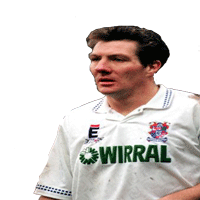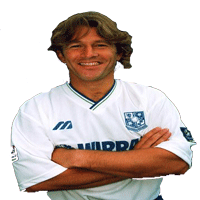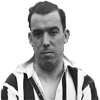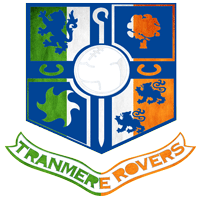
PAT NEVIN
Born: 6 September 1963 Place: Glasgow, Scotland Position: Winger Years: 1992-1997 Appearances:193 Goals: 30 International Caps: 28 International Goals:5
After retiring as a player, Nevin had a stint as chief executive of Motherwell. He resigned from the position in April 2002 after chairman John Boyle decided to place the club in administration due to serious financial problems. He now works as a football pundit for BBC Scotland’s Sportscene, Channel Five and BBC Radio Five Live.Nevin co-wrote a book, In Ma Head, Son, with psychologist Dr George Sik that was published in 1997. The book covers his experiences at Tranmere Rovers during the 1996–97 season and eschews the typical footballer’s autobiography being a dialogue with Sik which explores his worries, motivation and troubles as he comes to the end of his playing career.

IAN MUIR
Born: 5 May 1963 Place: Coventry, England Position: Striker Years: 1985-1995 Appearances: 314 Goals: 142 International Caps: 0 International Goals: 0
Muir’s playing style could be likened to that of Kenny Dalglish, albeit operating at the lower tier. He had fine ball control with his relatively low centre of gravity and demonstrated excellent awareneness of his team-mates’ positioning. He was also a ruthless finisher. Muir was signed to Tranmere Rovers by player-manager, Frank Worthington, who was his striking partner in his first season at the club. Despite his evident promise, he spent his early career at Rovers immersed in struggle, as the club languished in the basement of the league and Muir was part of the side that beat Exeter City 1-0 to save Rovers from automatic relegation from Division Four in 1987. He set up the crucial goal, headed in by Gary Williams in the 77th minute of the last game of that season. Muir prospered when new manager, John King, signed a big target-man, Jim Steel, as his strike partner in late 1987. Within four years, Rovers had been promoted twice and appeared at Wembley five times, with Muir scoring in the FA’s centenary celebrations in 1988 and in Tranmere’s Leyland DAF Trophy victory over Bristol Rovers in 1990. Injury prevented Muir partaking in the final strait of Rovers’ promotion run in 1991 when they reached the second tier of English football for only the second time in their history. That summer, the signing of John Aldridge at Tranmere led to the marginalisation of Ian Muir, who remained a regular goalscorer when called upon for the remainder of his Tranmere career. To a generation of Tranmere Rovers fans, Ian Muir is remembered as a legendary player, who played the starring role in the greatest period of the club’s history and also the finest centre forward not to have played in the top tier of English football.

STEVE YATES
Born: 29 January 1970 Place: Bristol, England Position: Defender Years: 1999-2002
Appearances: 113 Goals: 7 International Caps: 0 International Goals: 0
Yates was a cult hero at Tranmere, where he became a certified ‘goal machine’ and he is best remembered for scoring two goals in a Merseyside derby against Everton at Goodison Park when Tranmere dumped out the Premier League outfit 3-0 in the 2000-01 FA Cup. Yates stayed there up until 2002 when he transferred to Sheffield United. Whilst at Tranmere he played in the 2000 Football League Cup Final, coming on as a substitute in the final against Leicester City.

Steve Mungall
Born: 22 May 1958 Place: Bellshill, Scotland Position: Defender
Years: 1979-1996 Appearances: 513 Goals: 14 International Caps: 0
International Goals: 14
After joining Tranmere from Motherwell in 1979, Mungall went on to make more than 500 Football League appearances for Rovers in a 17-year period. This spell saw Rovers rise up the league and make several appearances at Wembley. He remained with the club on the coaching staff before leaving in October 2000 to pursue business interests.But he was quickly back in football and was given his big management opportunity in October 2001 at Chester. The Blues were struggling in the Football Conference when Mungall took over, initially as caretaker-manager. His first match ended in a 2-0 home win over Hereford United and he was soon handed the job on a permanent basis. But a dreadful run of form saw Chester dragged into serious relegation trouble and Mungall was sacked after a defeat to Northwich Victoria on 26 December 2001. Mungall was later on the coaching staff at Droylsden, a role he left in December 2007. On 13 February 2008, Mungall returned to Chester City as assistant manager to Bobby Williamson but he left along with Williamson early the following month.

IAN GOODISON
Born: 21 November 1972 Place: Montego Bay, Jamaica
Position: Defender Years: 2004-2014 Appearances: 366
Goals: 11 International Caps: 120 International Goals: 10
Goodison joined Tranmere in February 2004 under Brian Little and played in the heart of the defence. The former Jamaican international played more than 350 times for the club, and was named supporters’ Player of the Season three times, and the North West League One Footballer of the Year award also three times. He played in the Tranmere team which reached the quarter final of the FA Cup in his first season, whilst with his second season at the club Tranmere finished third in League One and entered the end of season play-offs. At the end of the 2011–12 season he signed a one-year contract extension which kept him at the club beyond his 40th birthday. He was the first player ever to play for Tranmere while in his forties. In May 2013, Goodison signed another year extension to his contract, keeping him at the club until the summer of 2014. The deal included an option for a testimonial at Prenton Park. On 27 August 2013 he played 120 minutes against Bolton Wanderers in the League Cup; his performance was praised by fans and he was labelled as the ‘best player on the park’ by manager Ronnie Moore.On 13 October 2013 Goodison made his 400th appearance for Tranmere and captained them to a 1-0 win at Bradford City. On 9 December 2013 it was reported that he had been arrested as part of a police investigation into match fixing, however the charges were later dropped. In May 2015, a testimonial for Goodison was held at Prenton Park. A team of Ex Tranmere Team Mates, including Enoch Showunmi, Eugine Dadi, Owain Fon Williams, and Ryan Lowe, faced an International XI, composed of Ex Jamaica team mates such as Ricardo Fuller, Darren Byfield, and Ricardo Gardner and other notable International players, such as Ex-Tranmere team mate John Achterberg and Fabrice Muamba, who has not played professionally since suffering a Cardiac Arrest whilst playing for Bolton. Brian Little and Ronnie Moore managed the two sides, with Mike Dean acting as referee.

John Morrissey
Born: 8 March 1965 Place: Liverpool, England Position: Winger
Years: 1985-1999 Appearances: 470 Goals: 50 International Caps: 0
International Goals: 0
John Morrissey could have earned his place in the Tranmere Hall of Fame for his 64 goals for the Club from the wing. It could have been his 585 appearances which put him fourth highest in the Club’s all time list behind only Ray Mathias, Harold Bell and Steve Mungall.But it’s most likely he was voted in for his skill, trickery and constant supply of goal scoring chances for his team mates. Morrissey began his career at Everton and moved to Wolverhampton Wanderers his career took him to Prenton Park in October 1985.He was rarely out of the side, or the number 7 shirt, over the next 14 seasons, supplying chances for the likes of Ian Muir, Chris Malkin, Jim Steel, John Aldridge and David Kelly from the wing.He is one of a small group of players who appeared for the Club all the way from Division Four to Division Two and at Wembley Stadium and was massively popular on and off the pitch.

DIXIE DEAN
Born: 22 January 1907 Place: Birkenhead, Cheshire, England
Position: Centre forward Years: 1923–1925 Appearances: 30
Goals: 27 International Caps: 16 International Goals: 18
Some said that Dean and his family disliked his nickname, and preferred people to call him “Bill” or “Billy”. The popular theory regarding how Dean acquired his nickname is that he did so in his youth, perhaps due to his dark complexion and hair (which bore a resemblance to people from the Southern United States). In Dean’s obituary in The Times, Geoffrey Green suggested that the nickname was taken from a “Dixie” song that was popular during Dean’s childhood; there was “something of the Uncle Tom about his features”.Alternatively, Tranmere Rovers club historian Gilbert Upton uncovered evidence, verified by Dean’s late Godmother, that the name “Dixie” was a corruption of his childhood nickname, Digsy (acquired from his approach to the children’s game of tag, where Dean would dig his fist into a girl’s back— hence “Digsy”).Dean initially played for his local club, Tranmere Rovers, before moving to Everton. Whilst at Tranmere, he was on the receiving end of a tough challenge which resulted in him losing a testicle in a reserve game against Altrincham.Immediately following the challenge, a teammate rubbed the area to ease the pain. Dean shouted “Don’t rub ’em, count ’em!”. He scored 27 goals in 30 league appearances for Tranmere Rovers and attracted the interest of many clubs across England, including Arsenal and Newcastle United. ]Upon leaving Tranmere Rovers, secretary Bert Cooke reneged on an agreement to pay 10 percent of the transfer fee to Dean. Dean was paid one percent of the fee, which he gave to his parents (who donated it to Birkenhead General Hospital). He later revealed that he expected a £300 signing fee to be given to his parents when he transferred to Everton. They received only £30, and Tranmere Rovers manager Bert Cooke told him “that’s all the League will allow”. Dean died on 1 March 1980 at age 73 after suffering a heart attack at Everton’s home ground Goodison Park whilst watching a match against their closest rivals, Liverpool. In prenton Park there is the Dixie Dean Suite and In May 2001 local sculptor Tom Murphy created a statue of Dean, which was erected outside the park end of Goodison Park at a cost of £75,000 with the inscription “Footballer, Gentleman, Evertonian”. In 2002, Dean was an inaugural inductee to the English Football Hall of Fame. There is an annual Dixie Dean award, which is given to the Merseyside player of the year; it has been won by players from his former clubs (Tranmere and Everton) and Liverpool F.C.On the 12th November 2016 Tranmere unveiled a plaque dedicated to Dixie Dean.
